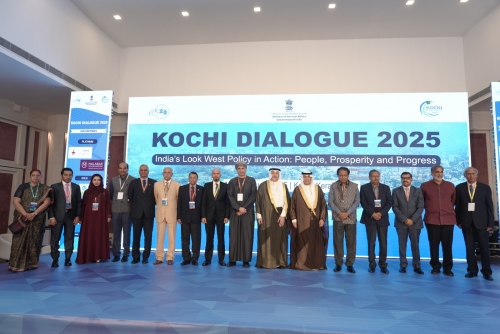India and GCC Nations Explore New Avenues for Collaboration at Kochi Dialogue 2025
TDT | Manama
Email: mail@newsofbahrain.com
The Kochi Dialogue 2025, a two-day Track 1.5 international diplomacy event, concluded on January 17 in Kerala, India, spotlighting the vast potential for collaboration between India and the Gulf Cooperation Council (GCC) nations. The event, hosted by the Centre for Public Policy Research (CPPR) in partnership with the Ministry of External Affairs, focused on fostering partnerships in trade, health, education, energy, technology, and maritime security.
Themed “India’s Looking West Policy in Action: People, Prosperity, and Progress,” the dialogue featured high-level participation, including diplomats, policymakers, business leaders, and stakeholders from India, GCC countries, and other nations such as Australia, Malaysia, and Sri Lanka.
Inaugural Session
The dialogue was virtually inaugurated by Shri Kirti Vardhan Singh, India’s Minister of State for External Affairs and Minister of State in the Ministry of Environment, Forest, and Climate Change. Notable addresses included remarks by H.E. Jasem Mohamed Albudaiwi, Secretary-General of the GCC, and Mr. Raghuram S (IFS), Joint Secretary of the Ministry of External Affairs, India.
Key Themes and Discussions
Over five focused sessions, experts and stakeholders explored opportunities and challenges in enhancing India-GCC relations across diverse sectors.
Trade and Investments:
Moderated by Ambassador T.P. Seetharam, discussions emphasized harmonizing tax systems, enhancing connectivity, and addressing bureaucratic barriers. Panellists, including leaders from business and industry, highlighted the potential of initiatives like the Comprehensive Economic Partnership Agreement (CEPA) to boost bilateral trade and investment.
Energy Partnerships:
Experts examined diversification and sustainability in energy collaborations, with Ms. Esha Srivastava (IFS) and H.E. Ahmed Mohamed Al Kaabi among the key speakers. With 45% of India’s energy imports sourced from the GCC, the dialogue focused on innovation and clean energy goals.
Healthcare and Education:
Panellists discussed strengthening ties in healthcare and education, emphasizing innovation and inclusivity. Notable participants included Dr. Hafeez Rahman, Chairman of Sunrise Hospitals, and Mr. Francis Joseph, Executive Director of GEMS Education.
Diaspora Connections:
Led by Ambassador Venu Rajamony, this session explored the role of the Indian diaspora in fostering cultural and economic ties. Panellists highlighted the importance of enhanced communication and exchange programs to bridge gaps.
Maritime Security:
The final session addressed non-traditional maritime threats and strategic partnerships. Vice Admiral G. Ashok Kumar and other experts called for stronger cooperation through White Shipping Agreements and integrated security frameworks.
Conclusion and Insights
In his closing remarks, Vice Admiral V. Srinivas, Flag Officer Commanding-in-Chief, Southern Naval Command, emphasized the strategic importance of the GCC to India's maritime and economic stability.
The Kochi Dialogue 2025 underscored the need for robust India-GCC collaboration, proposing actionable strategies to overcome legal barriers, harmonize financial systems, and deepen people-to-people and institutional connections.
This groundbreaking initiative reaffirmed India’s commitment to strengthening ties with its “extended neighborhood” and laid the groundwork for sustainable, inclusive, and innovative partnerships in the years ahead.
Related Posts

